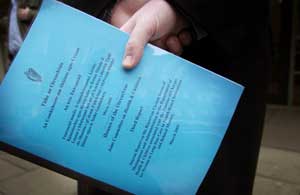16 March 2005 Edition
Sacrificing the few to save the many
BY JOANNE CORCORAN

"The Travers Report is a massive indictment of successive governments and successive ministers for health since 1976."
So said Sinn Féin TD Caoimhghín Ó Caoláin last week in his statement to the Dáil on what has become affectionately known as the 'Travesty' report.
Ó Caoláin was correct in his assertion. The report, undertaken by John Travers, the former head of Forfás, has revealed that for almost 30 years, every administration in the 26-County state turned a blind eye to the illegal charging of the most vulnerable in our society: medical card holders in nursing care homes. Conservative estimates put the number of people illegally charged for care in publicly funded homes at 275,000. Anything from €500 million to €2 billion is now expected to be claimed in compensation.
And yet, so far, only one person has been held accountable for this abuse of power. Former General Secretary of the Department of Health, Michael Kelly, has been forced to leave his position, but his punishment leaves much to be desired — the Government has moved him to another senior and very well-paid position as the full-time chairperson of the Higher Education Authority.
Fine Gael's Enda Kenny and Labour's Pat Rabbitte have been like Cheshire cats all week, seeing this affair and last weekend's by-election as harbingers of the current government's doom. Both are screaming for former Minister for Health Mícheál Martin's head on a plate. Martin has denied any knowledge of the charges, despite the fact civil servants are queuing up to say he was briefed him on the whole sordid affair.
He shares the blame, no doubt, but as far as anyone remembers, there have been several ministers for health in the last 30 years, and not all of them were from Fianna Fáil.
The current government is as adept at shifting blame as the two opposition parties appear to be. First, it attempted to retrospectively legalise the fees, but the Supreme Court ruled this unconstitutional last month.
Now, it is trying to place the responsibility at the foot of the civil service.
"While senior civil servants clearly cannot be exonerated, it is beyond question that the primary responsibility rests with ministers who are supposed to be accountable to the Dáil and to the people," Ó Caoláin said on Thursday.
He went on to highlight the fact that charges for some people were dropped because complaints were made. In a question to the present Minister for Health, Mary Harney, he said "If charges were being stopped in some instances because those who made complaints had certain information, or had a sufficient level of belief in the case they presented, it is incredible that this was not known by senior officials in the Department, the Minister and Ministers of State." Harney replied that this was indeed "extraordinary".
Asking who the Government did hold responsible, Ó Caoláin made the point: "It is harder to get a camel through the eye of a needle than it is for a member of the political elite in this State to accept responsibility and to abide by the consequences, up to and including resignation or dismissal."
Even more disturbing is the situation in which the state now finds itself.
"The Minister for Health and Children and the Minister for Finance have both stated that this massive bill will directly effect the overall health budget in terms of a negative impact on the future provision of services," Ó Caoláin said. "Let us make one thing very clear. People should not tolerate any diminution of health and social services as a result of the ineptitude and the neglect of successive Governments. The Government must look elsewhere for this revenue, whether by borrowing or otherwise."
Key findings of Travers
• The Department of Health and Children failed at the highest levels over more than 28 years to deal effectively with illegal charges levied on nursing home residents
• The Department undertook many reviews of the charging practice and all of them concluded that a simple legislative amendment would have solved the problem
• Legal advice was not sought from the Attorney General because of a "strong desire to protect what was regarded as an important source of 'own income' by the health boards as a means of protecting the provisions of essential health services in a system widely regarded as being under-funded."
• Successive Ministers did not probe the issue
• A crucial Department file on the issue has gone missing, implying a botched cover-up attempt.
• Ministers should insist on full and periodic briefings on key issues of policy and operational performance
